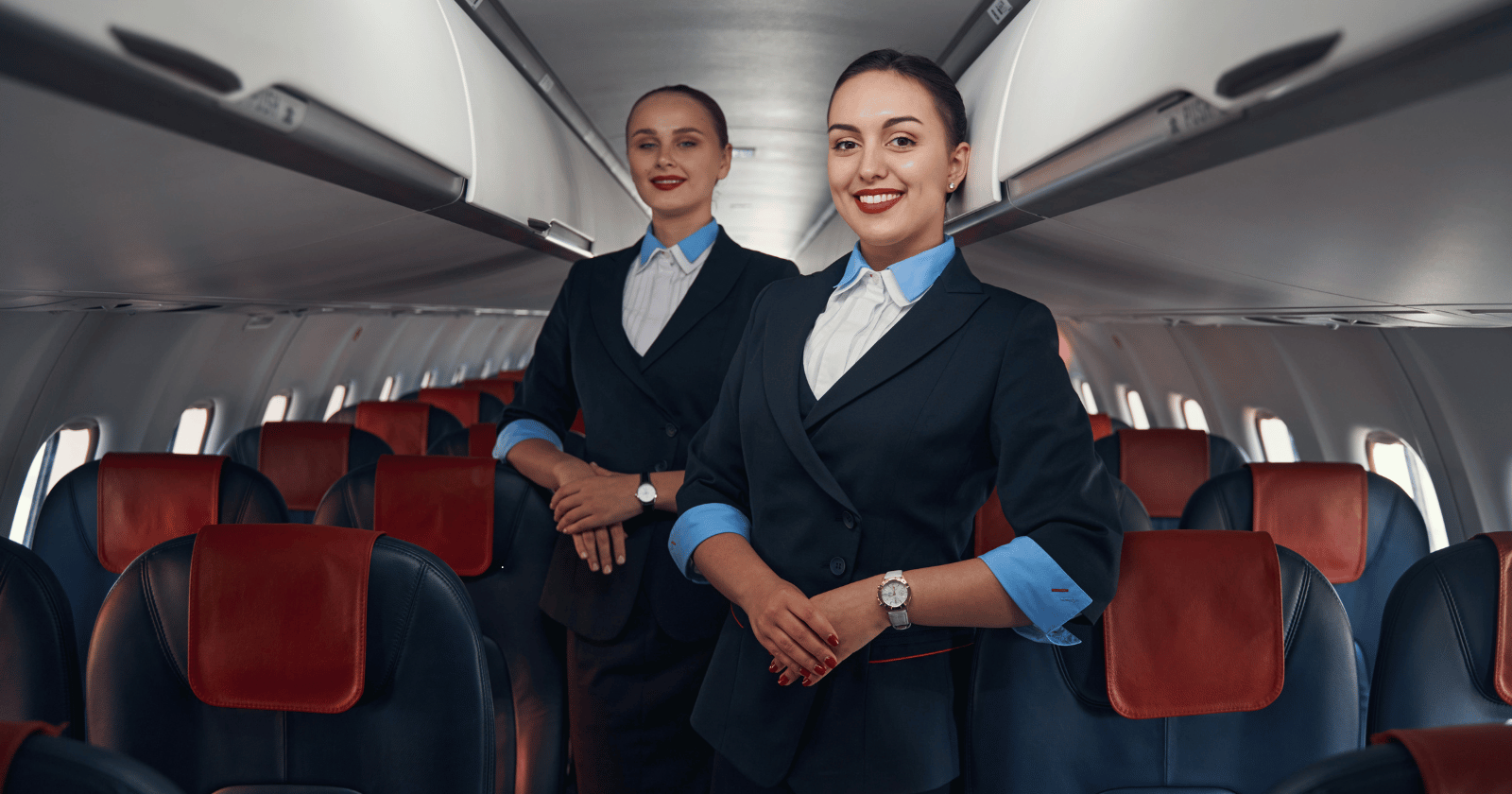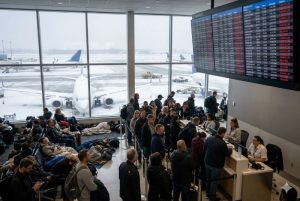They’re the generation everyone loves to mock online, but cabin crews quietly notice something very different at 35,000 feet.
Adam Kelton / Nov 18, 2025
They’re the generation everyone loves to mock online, but cabin crews quietly notice something very different at 35,000 feet.
You know that stereotype about entitled Boomers making unreasonable demands and holding up the line? I’ve seen enough of that viral content to last a lifetime. But here’s what those TikToks don’t show you.
After spending years in hospitality, where observing human behavior was basically part of my job description, I’ve noticed something interesting. The generation everyone loves to mock actually does a lot of things right when they travel. And flight attendants? They notice.
I’m not saying every Boomer is a model passenger. But there are certain habits this generation has that make cabin crew genuinely grateful. These aren’t the flashy, Instagram-worthy gestures. They’re quieter things. The kind of consideration that comes from growing up in a different era.
So let’s talk about what Boomers get right at 35,000 feet.
Ever notice how many Boomers still show up to the airport in actual clothes? Not pajamas masquerading as athleisure. Not slides with socks. Actual pants and closed-toe shoes.
Flight attendants appreciate this more than you’d think. It’s not about being stuffy or old-fashioned. It’s about safety and respect for shared space.
During my Bangkok years, I flew a lot between Southeast Asia and the States. The contrast was stark. Boomer passengers would board in collared shirts and comfortable but proper shoes. Younger travelers? Basically rolled out of bed.
Here’s why it matters to crew members. In an emergency evacuation, those proper shoes mean someone can actually move quickly without injury. Those real pants provide protection. And psychologically, when passengers dress with intention, they tend to behave with more intention too.
Flight attendants have told me that passengers who dress casually often act casually about safety protocols. The correlation isn’t perfect, but it’s there.
Plus, maintaining some standards in public spaces used to be more common. That consideration hasn’t disappeared from Boomer travelers, and cabin crew notice the difference.
Walk through any airport and you’ll see it. Some passengers treat flight attendants like they’re there to fetch and carry on command. The call button gets hammered for every little thing.
Boomers grew up with a different understanding of service roles. They remember when flying was formal. When flight attendants were respected professionals, not servants. That perspective tends to stick.
I saw this constantly during my hospitality days. The wealthiest clients, the ones who’d seen real service, never snapped their fingers or made unreasonable demands. They understood the difference between being served and being serviced.
Most Boomer passengers carry that distinction onto planes. They’ll wait for appropriate moments to make requests. They won’t ring the call button five times during a meal service because they forgot to ask for extra napkins. They plan ahead.
Flight attendants have a tough job. They’re primarily there for safety, not to be waitstaff. Crew members appreciate passengers who recognize that reality and act accordingly.
The small considerations matter. Waiting to ask for something until the attendant walks by. Not demanding immediate service when the seatbelt sign is on. Understanding that “no” sometimes means “not right now because we’re dealing with safety issues.”
Here’s something flight attendants love but rarely talk about: passengers who don’t create boarding chaos.
Boomers tend to arrive at the gate with time to spare. They’re usually in their boarding group when it’s called. They have their boarding pass ready. Their carry-on is within size limits because they actually checked the airline’s rules beforehand.
This drives smooth boarding, which makes everyone’s job easier. Including the passengers behind you.
I’ve watched countless boarding processes during my travels. The pattern is consistent. Older passengers typically have their act together. Younger travelers are still finishing their Starbucks, hunting for their boarding pass on their phone, arguing about overhead bin space.
Flight attendants work on tight turnaround times. Every minute matters. When passengers board efficiently, it reduces stress on the crew and keeps flights on schedule.
There’s also this: Boomers generally understand that their seat assignment is their seat assignment. They’re not trying to negotiate upgrades at the door or asking if they can move to an empty row before takeoff. They sit down, stow their bag, and let boarding continue.
That old-school respect for structure and rules? It actually makes the system work better for everyone.
This one might surprise you. But flight attendants are human beings who sometimes appreciate genuine human interaction during long shifts.
Boomers are more likely to make eye contact, say thank you, ask how someone’s day is going. Not in a demanding way. Just basic acknowledgment that the person serving them is a person.
During my time managing small teams in high-end restaurants, I learned how much these micro-interactions matter. When guests treated staff like human beings, the entire atmosphere improved. Service became a collaboration instead of a transaction.
The younger generations often have their AirPods in before the safety demonstration even starts. They avoid eye contact. They give one-word responses. It’s not malicious. It’s just a different social norm.
But flight attendants spend all day serving people. A brief, genuine conversation breaks up the monotony. Being treated like a human instead of a service robot makes the job more bearable.
Boomers grew up before smartphones eliminated the need for random conversations with strangers. That skill set hasn’t disappeared. And crew members appreciate it, especially on longer flights where the work becomes repetitive.
You’d think this would be universal. It’s not.
Most passengers scroll through their phones during the safety demo, even though it’s federal law to pay attention. Flight attendants have seen it all. They know most people tune out.
But Boomers? They actually watch. They follow along. They locate their nearest exit. They notice where the life vests are stored.
This matters in emergencies. Flight attendants are primarily safety professionals. When passengers pay attention to safety information, it’s not just respectful. It’s practical. Those few people who listened might be the ones who help during an evacuation.
I remember reading about that business jet crash in Naples where a flight attendant saved two passengers by guiding them out through an emergency exit. That attendant’s training mattered. But so did the passengers’ ability to follow instructions under pressure.
Boomers tend to take safety seriously. Maybe it’s because they remember when air travel was less common and therefore treated with more gravity. Maybe it’s just generational habits around respecting authority and following rules.
Whatever the reason, flight attendants notice which passengers actually absorb the safety information. And they’re quietly grateful for it.
Let’s talk about something gross for a second. Airplane bathrooms.
Flight attendants have horror stories. But interestingly, the culprits usually aren’t Boomers. Older passengers tend to leave the lavatory in reasonable condition. They wipe down surfaces. They don’t leave trash everywhere. They actually flush.
This comes down to basic consideration for shared spaces. Something that used to be emphasized more strongly a few generations back.
I dealt with plenty of bathroom situations in my restaurant days. The correlation between age and cleanliness was real. Older clientele generally left facilities in better condition. Not universally, but enough to notice the pattern.
Flight attendants aren’t janitors, but cleaning up after passengers is part of their job. When travelers make an effort to leave things tidy, it saves time and reduces the unpleasant aspects of the work.
Plus, on long flights, bathroom conditions deteriorate quickly. When each passenger leaves it slightly better than they found it, everyone benefits. Boomers seem to understand this social contract better than younger generations who’ve become accustomed to someone else always cleaning up after them.
Crew members have a love-hate relationship with being filmed. Sometimes it’s harmless. Sometimes it crosses boundaries. And sometimes it makes their job actively harder.
Boomers generally don’t have their phones out constantly documenting every moment. They’re not filming the safety demo for TikTok. They’re not trying to catch crew members making mistakes to post online. They’re just traveling.
This creates a less tense environment for flight attendants who are already dealing with enough scrutiny. One viral video can end someone’s career, even if the context is missing or the situation was completely reasonable.
The constant documentation of everything by younger passengers adds an extra layer of stress. Flight attendants have to worry not just about doing their job well, but about how a five-second clip might look without context when it’s shared to millions of people.
Boomers remember when experiences happened without being immediately broadcast. When mistakes could be made and corrected privately. When human interactions didn’t require performing for an invisible audience.
That absence of constant recording lets flight attendants work with less anxiety about being the next internet villain.
Okay, this one’s specific to certain situations. Not all airlines allow tipping, and it’s not expected. But on private charters or certain international carriers where tipping is appropriate, Boomers usually understand the protocol.
They come from an era when service workers relied on tips and when the etiquette around gratuity was clearer. They remember to tip wheelchair attendants. They know to palm a bill to the lead attendant on charters. They understand the economics of service work.
Younger generations often don’t tip service workers in travel situations, either because they don’t realize it’s appropriate or because tipping culture has become so contentious that they’ve opted out entirely.
I worked in fine dining where tips were everything. The guests who understood service economics made the difference between paying rent and struggling. That awareness seems more prevalent in older travelers.
Flight attendants on carriers where tipping occurs definitely notice who recognizes their work with appropriate gratuity and who doesn’t. It’s not about entitlement. It’s about understanding how service industries work and showing appreciation accordingly.
Finally, here’s something that seems small but makes a real difference. Boomers come prepared.
They bring their own snacks instead of constantly asking if there’s anything else available. They have books or downloaded content ready instead of demanding Wi-Fi troubleshooting. They packed their medications, their chargers, their reading glasses.
This self-sufficiency reduces the burden on flight attendants who already have a full plate managing safety, service, and everything in between.
I learned in Bangkok that the best travelers are the ones who don’t need constant assistance. They’ve thought through what they’ll need. They’ve planned ahead. They can entertain themselves without requiring external support.
Flight attendants appreciate passengers who arrive equipped to handle their own basic needs. It’s not about being unfriendly or unwilling to help. It’s about respecting that crew members have limited resources and many passengers to serve.
When someone can spend six hours on a plane without making multiple requests for things they could have brought themselves, it frees up the flight attendants to focus on actual problems and safety concerns.
Look, I’m not here to start a generational warfare. Every age group has great travelers and terrible ones. But the habits that Boomers bring to air travel often reflect values that have gotten lost in our rush toward convenience and individualism.
Consideration for shared spaces. Preparation and planning. Respect for workers doing difficult jobs. Basic cleanliness and courtesy. These aren’t revolutionary concepts. They’re just increasingly rare.
Flight attendants notice who makes their job easier and who makes it harder. And quietly, without making a big deal about it, they appreciate passengers who still practice the small courtesies that used to be standard.
Next time you fly, maybe try adopting a few of these habits yourself. Dress like you’re going somewhere that matters. Show up prepared. Treat the crew like human beings. Leave things cleaner than you found them.
You might not get thanked out loud. But trust me, it’s noticed.
Each herb holds a unique kind of magic — soothing, awakening, grounding, or clarifying.
This 9-question quiz reveals the healing plant that mirrors your energy right now and what it says about your natural rhythm.
✨ Instant results. Deeply insightful.
Adam Kelton is a writer and culinary professional with deep experience in luxury food and beverage. He began his career in fine-dining restaurants and boutique hotels, training under seasoned chefs and learning classical European technique, menu development, and service precision. He later managed small kitchen teams, coordinated wine programs, and designed seasonal tasting menus that balanced creativity with consistency.
After more than a decade in hospitality, Adam transitioned into private-chef work and food consulting. His clients have included executives, wellness retreats, and lifestyle brands looking to develop flavor-forward, plant-focused menus. He has also advised on recipe testing, product launches, and brand storytelling for food and beverage startups.
At VegOut, Adam brings this experience to his writing on personal development, entrepreneurship, relationships, and food culture. He connects lessons from the kitchen with principles of growth, discipline, and self-mastery.
Outside of work, Adam enjoys strength training, exploring food scenes around the world, and reading nonfiction about psychology, leadership, and creativity. He believes that excellence in cooking and in life comes from attention to detail, curiosity, and consistent practice.
Nov 18, 2025
Nov 18, 2025
Nov 18, 2025
Nov 18, 2025
Nov 18, 2025
Nov 18, 2025
Nov 18, 2025
Nov 18, 2025
Nov 18, 2025
Nov 18, 2025
Nov 18, 2025
Nov 18, 2025
A Brown Brothers Media Company © 2025 All Rights Reserved.




